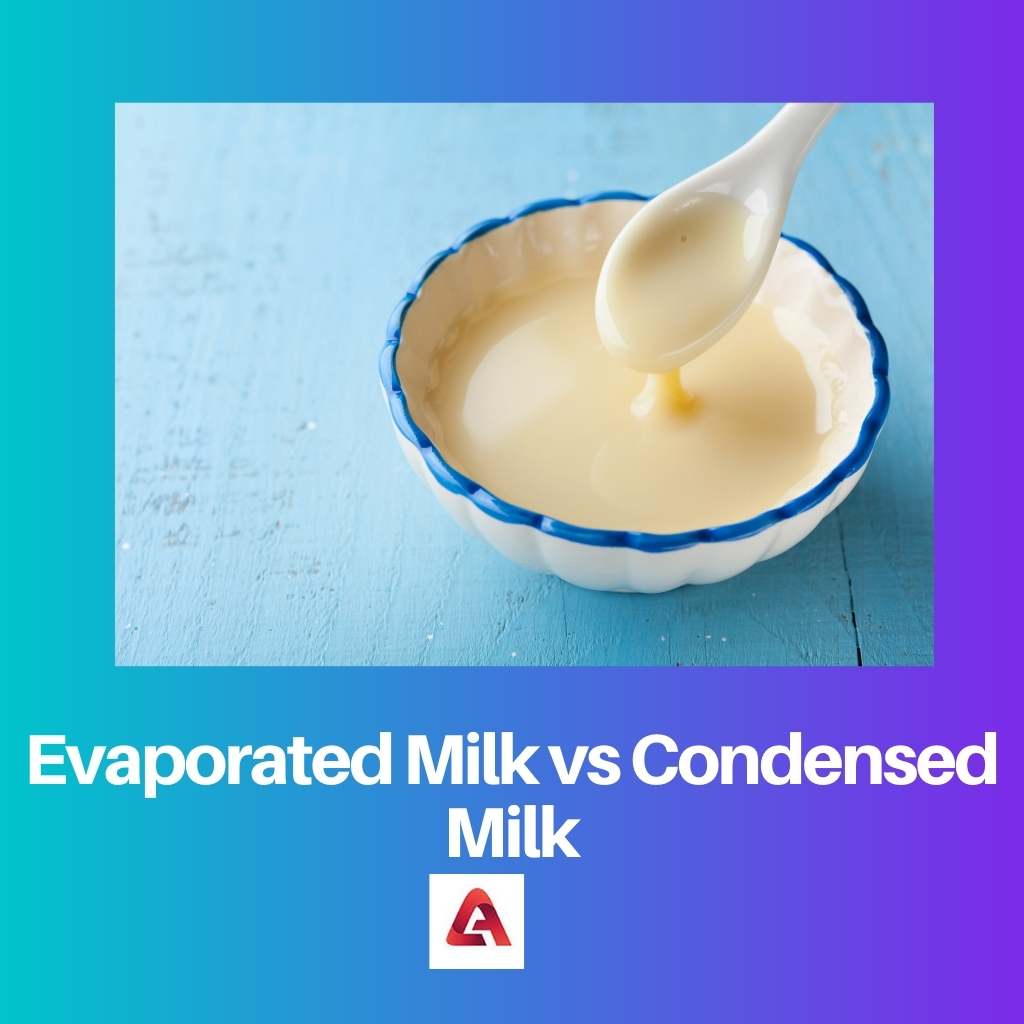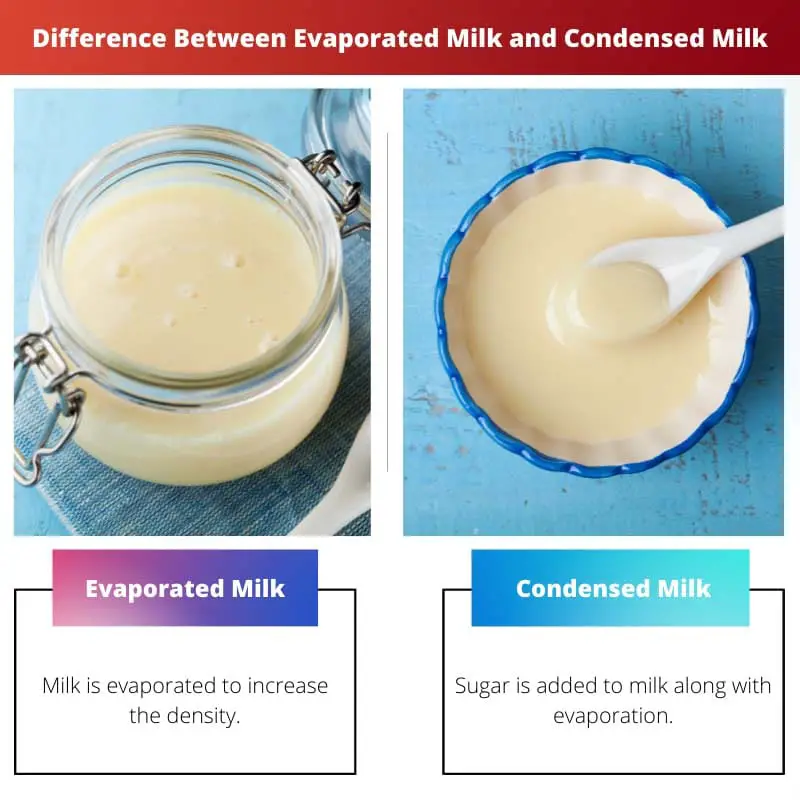Evaporated and Condensed milk is made from fresh milk. The milk is vacuum-sealed, which removes nearly half of the water and concentrates the milk’s nutritional content.
To avoid spoiling, the evaporated milk is placed into heat-sterilized cans. The ultrahigh sterilizing temperatures cause the milk sugars to caramelize, giving evaporated milk its distinctive cooked flavour. They both can be used for the cooking of many dishes.
Key Takeaways
- Both evaporated and condensed milk is forms of milk that have had water removed.
- Evaporated milk has a caramel-like color and is unsweetened, while condensed milk is thick and sweet due to added sugar.
- Evaporated milk is commonly used in cooking, while condensed milk is used in desserts.
Evaporated Milk vs Condensed Milk
The difference between evaporated milk and condensed milk is that Evaporated milk is unsweetened and created by boiling milk to lower the water content. Condensed milk, on the other hand, is milk that has been heavily sweetened. The end product is thick, pudding-like milk with a sweetness comparable to cake icing. The most important thing to remember is that in most recipes, evaporated milk is utilized as the liquid, whereas sweetened condensed milk is used for its sugar.

Evaporated milk is manufactured like condensed milk: by heating milk until approximately 50-60% of the water content has evaporated.
Following that, the mixture is homogenized, packed, and sterilized. As a consequence, you’ll have thick, creamy, ultra-concentrated milk that you can bottle and store for months.
Furthermore, the high heat used in processing gives the milk a somewhat caramelized flavour and a darker color than regular milk.
Condensed milk and sweetened condensed milk are interchangeable terms for condensed milk. As 60% of the water is removed from the condensed milk, it is shelf-stable. It’s full of flavour, with strong sweetness and a hint of caramel.
Condensed milk is used in kitchens all over the world.
Comparison Table
| Parameters of Comparison | Evaporated Milk | Condensed Milk |
|---|---|---|
| procedure for making | Milk is evaporated to increase the density. | Sugar is added to milk along with evaporation. |
| Sugar | There is no additional sugar in evaporated milk, the consistency of the milk is denser than normal milk. | There is 40-45 percent sugar in condensed milk. |
| Color | It has a deeper hue and a milder taste than regular milk. | It has a caramel hue and a very sweet taste. |
| Usage | When a creamy texture is wanted but no additional sweetness is required, evaporated milk is utilized in meals. | Condensed milk is a typical ingredient in baked goods and sweets such as pies, puddings, and ice cream. |
| Shelf life | Evaporated milk has a shelf life of a year. | Condensed milk could last more than a year. |
What is Evaporated Milk?
Evaporated milk is created by heating it until about 60% of its water content evaporates, as the name indicates. Milk is purified (cooked to a specific temperature) to remove germs and other undesirable organisms that naturally occur in milk.
This procedure eliminates all surplus water in the milk, leaving just the concentrated milk product. The mixture is then seasoned, packaged, and flavoured.
As a result, you’ll get thick, creamy, ultra-concentrated milk that may be stored in bottles for months. Because of the high heat utilized in processing, it has a slightly flavoured flavour as well as a darker color than conventional milk.
Evaporated milk comes in skim, low-fat, and whole milk types. When a creamy texture is wanted but no additional sweetness is required, evaporated milk is utilized in meals.
Sweetened condensed milk, on the other hand, adds extra sugar. Because the extra sugar suppresses bacterial development, sweetened condensed milk requires less processing to keep it fresh.
Disodium Phosphate (process aid to avoid coagulation) and carrageenan (to “stabilize,” i.e. prevent solids from settling) are commonly added to evaporated milk, as well as additional vitamins C and D.

What is Condensed Milk?
Condensed milk is a shelf-stable product that is concentrated milk that has had roughly 60% of the water removed, followed by the addition of sugar before canning.
Sugar is added to evaporated milk in about a 50/50 ratio to condensed milk, which is then chilled and bottled. Condensed milk has a sugar level of 40-45 percent.
Depending on the producer, the sugar content of condensed milk ranges from 40 to 45 percent.
With a rich sweetness and a flavour of caramel, it’s smooth and creamy. Sweetened condensed milk and condensed milk are both terms for condensed milk.
Since unsweetened condensed milk is evaporated milk, you won’t find any items branded as such. Condensed milk is used in kitchens all over the world, from the United States to Europe, Latin America, and Asia.
Sweetened condensed milk is commonly used as a sweetener in baked goods and desserts like pie, pudding, and ice cream, as well as in coffee and tea.
Sweetened condensed milk is a thick, sweet substance that, if not opened, may be stored for years without refrigeration. In several nations, the product is utilized in a variety of dessert dishes.
Main Differences Between Evaporated Milk and Condensed Milk
- Fresh milk is heated to make it denser, and that dense milk is known as evaporated milk, whereas condensed milk is evaporated milk with some added sugar and other ingredients.
- Evaporated milk has a one-year shelf life, however, condensed milk can last up to two years.
- Condensed milk is common in baked goods and sweets such as pies, puddings, and ice cream. Condensed milk is a common ingredient in baked goods and desserts such as pies, puddings, and ice cream, whereas when a creamy texture is required, evaporated milk is a good option.
- Condensed milk has a caramel color and a very sweet taste, whilst evaporated milk has a darker tint and a more flavoured taste than regular milk.
- Evaporated milk isn’t sweetened; it’s simply thicker than ordinary milk, but condensed milk has a sugar level of 40-45 percent.




